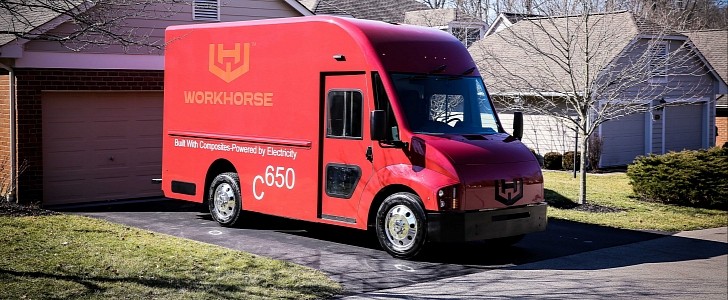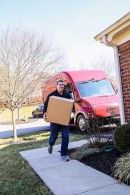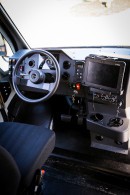It looks like Ohio-based startup Workhorse can’t catch a break. After big dreams of becoming the first to develop a fully-electric last-mile delivery van, now it’s left with having to go back to the drawing board, after the decision to redesign the C-1000 was officially announced on Monday.
The C-1000 was supposed to be a “revolutionary” step van that would become a clean, but equally performant alternative to the standard models used for last-mile deliveries. And it did look promising. One of its most innovative characteristics was the 100% composite monocoque body that made it significantly lightweight, by cutting 4,000 lbs (1,814 kg) of the chassis and bodyweight. The key advantage was that even though much lighter than a conventional vehicle, it would still offer the same payload and cargo volume.
Ironically, it was precisely the payload capacity that seemed to get negative feedback from the initial customers. In the recently released statement, CEO Rick Dauch (who was recently appointed himself) stated that the payload capacity of the Workhorse vehicles needs to be “further increased”, which inevitably means a redesign of the C-1000. It seems that 133 C-Series vehicles have been built so far, with 14 delivered to customers in the second quarter of the year.
Not all is lost, with Workhorse planning to keep a limited production of their current electric vans, for the customers who were satisfied with the cargo capacity and those who are interested in road testing the vans. Meanwhile, the C-1000 will be redesigned, to increase its 1,000 cubic feet of cargo space and 6,000 lbs (2,721 kg) payload capacity. At least, the electric powertrain won’t have to go through any modifications. The C-1000 is powered by a modular battery pack system that delivers 70 kWh in the four-pack configuration, with a 100-mile range.
Workhorse has had a complicated history since the beginning, when it was making GM platform-based vans. After recent legal and financial struggles, the unsuccessful debut of the C-1000 hits even heavier. Dauch hopes to come up with a “strategic roadmap” by the end of this year. Whether the EV manufacturer will make it through this or not is up for debate at this point.
Ironically, it was precisely the payload capacity that seemed to get negative feedback from the initial customers. In the recently released statement, CEO Rick Dauch (who was recently appointed himself) stated that the payload capacity of the Workhorse vehicles needs to be “further increased”, which inevitably means a redesign of the C-1000. It seems that 133 C-Series vehicles have been built so far, with 14 delivered to customers in the second quarter of the year.
Not all is lost, with Workhorse planning to keep a limited production of their current electric vans, for the customers who were satisfied with the cargo capacity and those who are interested in road testing the vans. Meanwhile, the C-1000 will be redesigned, to increase its 1,000 cubic feet of cargo space and 6,000 lbs (2,721 kg) payload capacity. At least, the electric powertrain won’t have to go through any modifications. The C-1000 is powered by a modular battery pack system that delivers 70 kWh in the four-pack configuration, with a 100-mile range.
Workhorse has had a complicated history since the beginning, when it was making GM platform-based vans. After recent legal and financial struggles, the unsuccessful debut of the C-1000 hits even heavier. Dauch hopes to come up with a “strategic roadmap” by the end of this year. Whether the EV manufacturer will make it through this or not is up for debate at this point.







